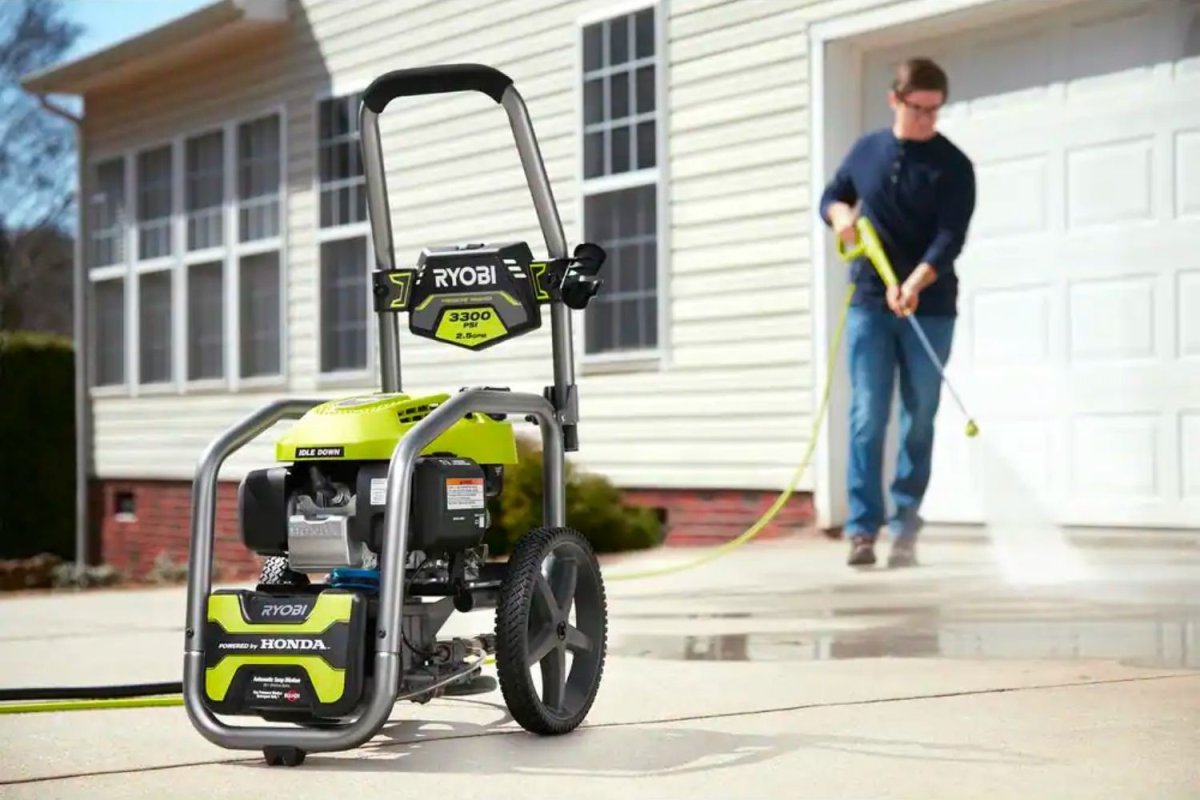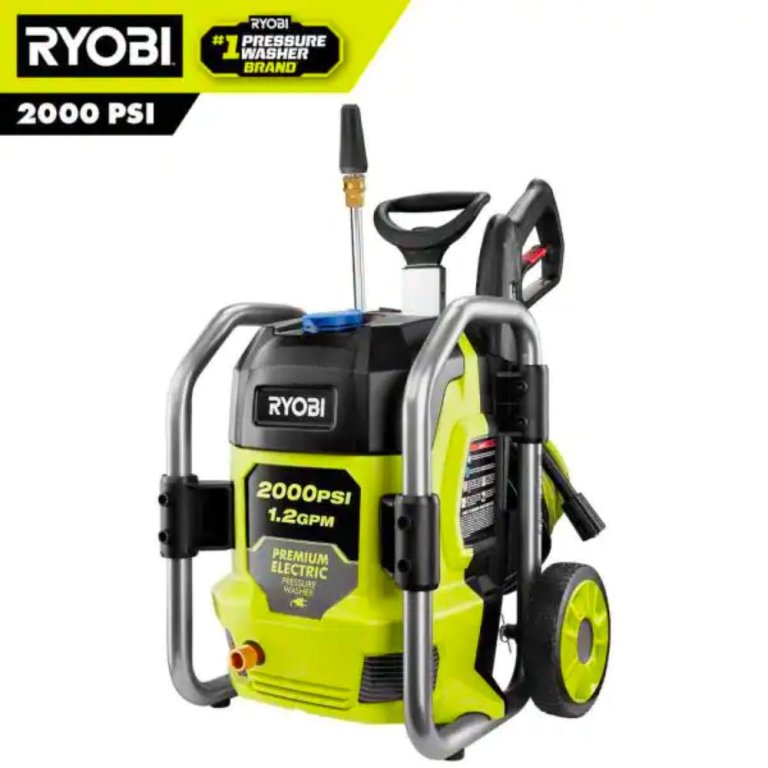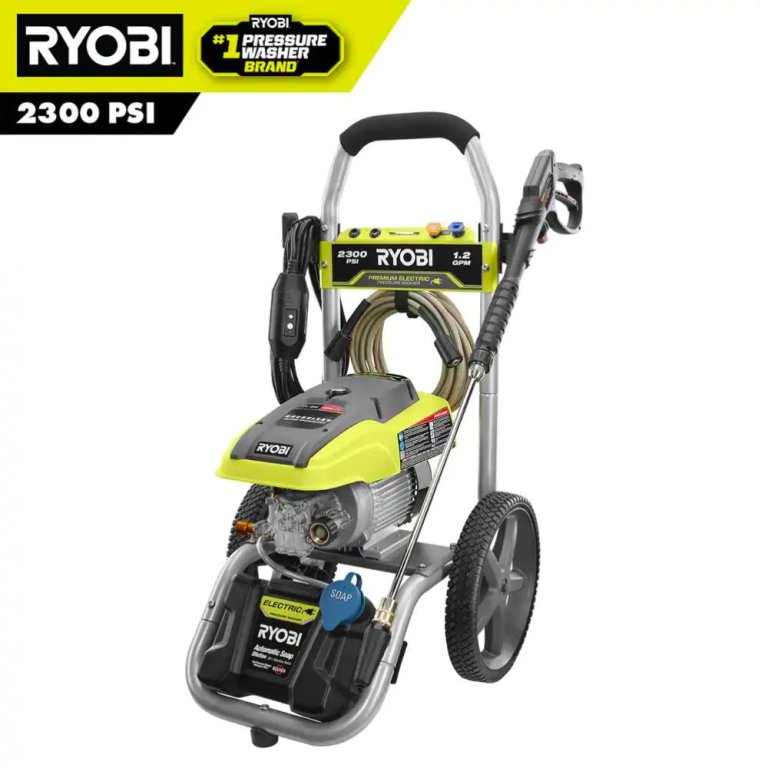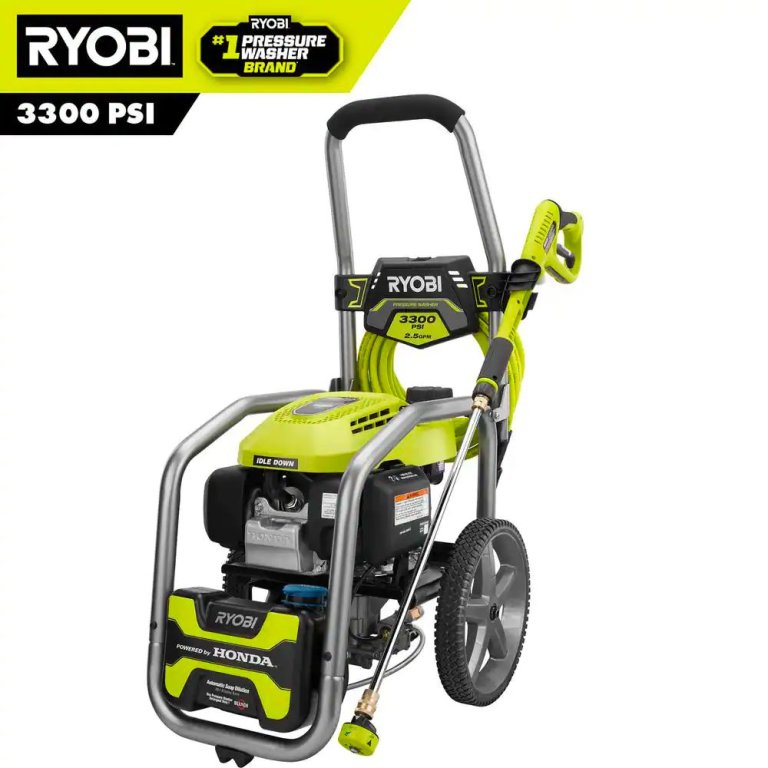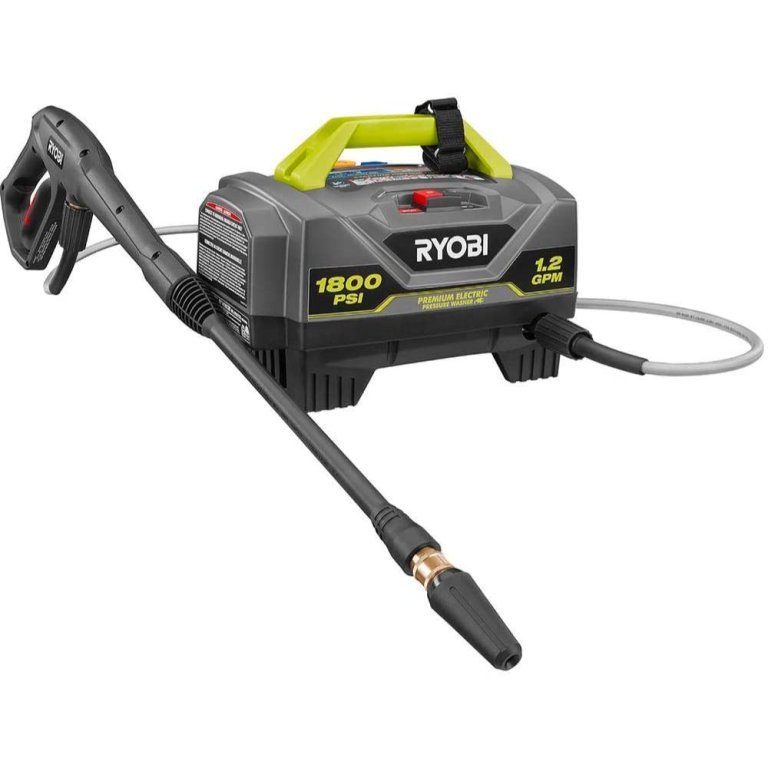We may earn revenue from the products available on this page and participate in affiliate programs. Learn More ›
Best Overall

RYOBI RY802900 Pressure Washer
Best Bang for the Buck
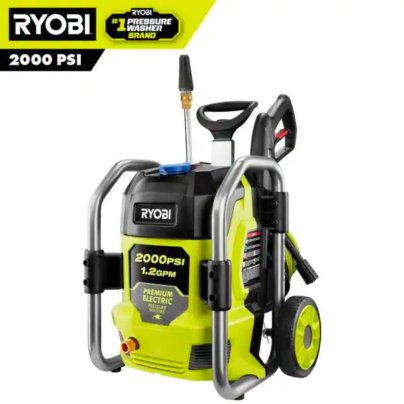
RYOBI 2000 PSI Electric Pressure Washer
Best Electric
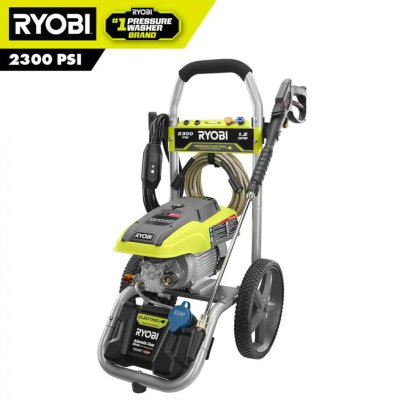
RYOBI High Performance Electric Pressure Washer
The Ryobi brand has long been a trusted source in power tools and lawn equipment. In recent years, the company has broadened its footprint in the pressure washer category to include an impressive lineup of gas and electric models. It also produces a Ryobi cordless pressure washer that fans of the ONE+ series may want to consider. If you’re in the market for the best pressure washer for cars and general cleaning tasks around the house and garage or larger, more intensive projects, Ryobi may have a tool for you.
We’ve researched Ryobi’s current offerings to find the best options for home use. We’ll take a look at the different shopping considerations that guided our choices before diving into individual reviews. First, take a look at our picks for some of the best Ryobi pressure washers.
- BEST OVERALL: RYOBI RY802900 Pressure Washer
- BEST BANG FOR THE BUCK: RYOBI 2000 PSI Electric Pressure Washer
- BEST ELECTRIC: RYOBI High Performance Electric Pressure Washer
- BEST GAS: RYOBI 3300 PSI Gas Pressure Washer
- BEST COMPACT: RYOBI 1,800 PSI Electric Pressure Washer, RY141820VNM

Product Comparison
| Powered by | PSI | GPM | |
| RYOBI RY802900 Pressure Washer | 173-cc gasoline engine | 2,900 | 2.3 |
| RYOBI 2000 PSI Electric Pressure Washer | 13-amp corded electric motor | 2,000 | 1.2 |
| RYOBI High Performance Electric Pressure Washer | 13-amp brushless electric motor | 2,300 | 1.2 |
| RYOBI 3300 PSI Gas Pressure Washer | 201-cc Honda gasoline engine | 3,300 | 2.5 |
| RYOBI 1,800 PSI Electric Pressure Washer, RY141820VNM | 13-amp electric motor | 1,800 | 1.2 |
Our Top Picks
Ryobi offers dozens of pressure washers for sale, so shoppers must choose from all the options, some of which have overlapping abilities. After reviewing the tools, we selected the following models as some of the best Ryobi pressure washers for specific uses, because each unit offers a good range in versatility and value within the category.
Best Overall
RYOBI RY802900 Pressure Washer
What We Like
- Excellent water pressure and flow for medium and large projects
- 12-inch flat-free wheels
- 35-foot pressure hose
- Hand-truck-style frame
What We Don’t Like
- Narrow, hard wheels are less mobile on rough ground
- Requires fuel and regular gas engine maintenance
Product Specs
- Powered by: 173-cc gasoline engine
- PSI: 2,900
- GPM: 2.3
Wash the car, scrub the driveway, and clean the windows with one versatile pressure washer. The Ryobi RY802900 washer is powered by a 173-cc OHV gasoline engine capable of producing up to 2,900 psi with a plentiful water flow at 2.3 GPM. The upright hand-truck-style frame rolls easily down the driveway or across the yard on large 12-inch flat free wheels.
A 35-foot non-marring pressure hose provides excellent range for cleaning large projects, tackling tough-to-reach locations, or working on a ladder. For versatile cleaning and less downtime, the steel spray wand comes equipped with a five-in-one quick-change nozzle.
Get the Ryobi RY802900 pressure washer on Amazon or at The Home Depot.
Best Bang for the Buck
RYOBI 2000 PSI Electric Pressure Washer
What We Like
- Good pressure and flow for small to medium tasks
- Telescoping handle and 6-inch wheels
- Protective metal roll cage
- 35-foot power cord and 25-foot pressure hose
What We Don’t Like
- Underpowered for larger tasks
- Small wheels navigate pavement with some difficulty
Product Specs
- Powered by: 13-amp corded electric motor
- PSI: 2,000
- GPM: 1.2
For those who need a compact, capable electric pressure washer that’s easy to use and store, this Ryobi 2,000-psi electric pressure washer produces a 1.2 GPM flow rate, ideal for washing the car or grill without damaging paint. With a 35-foot power cord and 25-foot pressure hose, it has good range and mobility to maneuver without requiring repositioning.
An onboard detergent injection system makes soap application easy. A metal roll cage protects the unit from dings and breakage if the user tugs a little too hard on the hose. The kit includes a turbo nozzle, 15-degree spray tip, and soap applicator spray tip, which store conveniently on the body of the washer when not in use.
Get the Ryobi 2000 PSI electric pressure washer at The Home Depot.
Best Electric
RYOBI High Performance Electric Pressure Washer
What We Like
- Large 12-inch wheels for off-pavement mobility
- Hand-truck frame for easy transport
- Includes turbo nozzle for faster cleaning
What We Don’t Like
- Limited number of included accessories
- Effective, but may be slow for larger projects
Product Specs
- Powered by: 13-amp brushless electric motor
- PSI: 2,300
- GPM: 1.2
For washing the car, deck, patio furniture, windows, or driveway, this unit is a versatile pick for small to large projects and everyday use. The Ryobi High Performance pressure washer boasts convenient transport, easy storage, and general-purpose cleaning capabilities. The quiet, high-efficiency brushless 13-amp electric motor pushes 1.2 GPH at up to 2,300 psi.
A 35-foot power cord and 25-foot pressure hose provide sufficient range and mobility for most typical driveway or backyard cleanup projects. It’s built on a hand-truck-style frame with large 12-inch wheels for easy mobility through the landscape and a minimal footprint in storage. The package includes a turbo nozzle, two spray tips with onboard accessory storage, and an in-line soap dispenser.
Get the Ryobi high performance electric pressure washer at The Home Depot.
Best Gas
RYOBI 3300 PSI Gas Pressure Washer
What We Like
- Outstanding power for large projects
- Reliable Honda gas engine
- Extra-long pressure hose
- Fold-down handle for compact storage
What We Don’t Like
- High price
- Requires routine gas engine maintenance
Product Specs
- Powered by: 201-cc Honda gasoline engine
- PSI: 3,300
- GPM: 2.5
Our pick for the best Ryobi gas pressure washer is powered by a reliable, fuel-efficient, easy-to-start 201-cc Honda engine. Idle-down tech decreases fuel consumption, noise, and pump life, and the washer pushes out 2.5 GPM of water at up to 3,300 psi for excellent large project cleaning performance.
Built on a hand-truck platform for rugged use, it features 12-inch flat-free wheels, a tubular steel roll cage, and fold-down handle for compact storage. Included in the kit are an extra long 50-foot pressure hose, five-in-one quick-connect nozzle, and an onboard detergent tank. It’s an ideal choice for cleaning large driveways, decks, siding, and windows.
Get the Ryobi 3300 PSI gas pressure washer at The Home Depot.
Best Compact
RYOBI 1,800 PSI Electric Pressure Washer, RY141820VNM
What We Like
- Compact and easy to store
- Lightweight and easy to transport
- Good cleaning power for small tasks
What We Don’t Like
- Not effective for larger projects
Product Specs
- Powered by: 13-amp electric motor
- PSI: 1,800
- GPM: 1.2
Those looking for a compact pressure washer with good cleaning power for small jobs like washing the car or cleaning lawn equipment may want to consider the Ryobi RY141820VNM electric pressure washer. It offers 1.2 GPM and 1,800 psi of cleaning power. A 35-foot power cord and 20-foot pressure hose provide good working range and maneuverability.
The kit includes a turbo nozzle and two additional spray nozzles that store conveniently on the unit when not in use. The tool-box-style framework is lightweight and stores easily on a shelf or inside a cabinet. The quick-connect spray gun and wand collapse for compact storage.
Get the Ryobi 1,800 PSI electric pressure washer on Amazon or at The Home Depot.
How We Chose the Best Ryobi Pressure Washers
With the dozens of gas and electric Ryobi pressure washers on today’s market, it can be difficult to narrow the field. We evaluated and identified some of the best options based on the typical types of jobs required around a home.
We chose heavy-duty and medium-duty gas-powered models with higher combined psi and GPM capabilities. Electric pressure washers excel for light- to medium-duty cleaning tasks in which more powerful gas machines might damage sensitive surfaces. We also included a budget-friendly, lightweight, compact electric model suitable for small tasks and storage spaces. These models represent functionality and value within each category.
What to Consider When Choosing a Ryobi Pressure Washer
With dozens of models to choose from, it’s helpful to have a method to narrow the search. The following key pressure washer characteristics can help when shopping.
Gas vs. Electric
Gas pressure washers produce more water pressure at a greater flow rate than electric pressure washers. This, along with the fact that they don’t have to be tethered to a power cord, means gas pressure washers are especially useful for larger, dirtier projects, such as cleaning fences, driveways, and house siding.
Electric pressure washers typically produce somewhat lower water pressure at about half the flow rate of gas. They are typically smaller, lighter, quieter, and easier to store than their gas-powered counterparts. Electric pressure washers are a good choice for cleaning everyday household objects, such as cars, lawn mowers, patio furniture, driveways or patios.
Intended Use
When shopping for a pressure washer, consider its intended use. Use the psi rating as a tool to help determine if the model in consideration can perform the desired tasks.
While it’s possible to use a stronger pressure washer for a lighter task, care must be taken to avoid damaging the material’s finish and surface. Common household cleaning projects, along with the ideal pressure washer psi rating for each task, include:
- Cars, bikes, and grills: up to 1,500 psi
- Decks and fences: 2,500 psi
- House siding and driveway pavement: 3,000 psi
- Industrial cleaning and paint stripping: 4,000 psi
Flow Rate and PSI
A pressure washer’s cleaning power is expressed in terms of its flow rate and water pressure.
Flow rate, expressed in gallons per minute (GPM), is the amount of water that flows through the machine at any given time. The GPM rating is a good indicator of a pressure washer’s power. Increasing the flow from 1.0 to 2.0 GPM flushes soil from a surface twice as fast.
Water pressure is measured in pounds per square inch (psi), and it’s the strength of the water stream the washer creates. The psi rating indicates a pressure washer’s ability to lift stuck-on dirt from a surface. Raising water pressure from 2,000 to 3,000 psi increases the distance the user can hold the spray tip from a surface.
Spray Wand
Pressure washer spray wands are not universal. The spray gun body is typically plastic, with either a molded or lever-style triggering mechanism. The connectors between the spray gun and pressure hose and between the spray gun and the wand are usually threaded brass, but they also may be heavy-duty metal quick connectors or light-duty plastic components.
Light-duty electric washers use plastic components that would not hold up to the intense pressure produced by heavy-duty machines. Entry-level units often have a plastic wand with a built-in adjustable plastic spray tip. High-quality pressure washers feature stainless steel spray wands with brass quick connectors to swap out the spray tips.
Portability
Portable pressure washers come in different forms. Key features to watch for include the washer’s overall size and weight, frame style, handle configuration, and wheel type and size. The smallest, most lightweight units are about the size of a large lunch box or small cooler. They have no wheels and are lightweight and compact, so they can be picked up and easily stored.
Most pressure washers have either a hand-truck- or wheelbarrow-style frame. A vertical hand-truck configuration takes the bulk of the weight off the user, but it can be somewhat top heavy. The wheelbarrow configuration allows for a low center of gravity that can be very stable, but puts more weight on the user during transport.
Wheel size and type affect the unit’s mobility over different surfaces. Swivel casters make it easy to maneuver in any direction on hard, flat surfaces. Large wheels, 8 inches or more in diameter, roll easily on uneven surfaces. Pneumatic tires work best for crossing grassy, muddy, and other natural surfaces. A comfortable handle height makes it easier and safer to move a large, heavy model.
Accessories
In addition to the main unit, pressure hose, and spray wand, accessories affect the washer’s cleaning ability and convenience. To perform different tasks, changeable spray tips adjust the spray pattern from a strong narrow jet to a diffused wide fan. A turbo nozzle creates a narrow rotating jet that cleans up to 50 percent faster than a regular spray tip.
Soap tips and foam cannons dispense cleansers so that they adhere to the surface to saturate and eliminate dirt. Other Ryobi pressure washer accessories that can be purchased separately include surface cleaners, power brushes, a chemical nozzle kit, and more.
Tips for Using a Ryobi Pressure Washer
Ryobi pressure washers are designed to be durable and easy to use. For best results, follow the assembly, operating, and care instructions that come with the machine.
The following are general best practices for cleaning with a pressure washer.
- Position the pressure washer in a central location.
- Unroll the pressure hose, eliminate any kinks, and connect to the washer and spray gun/wand.
- Select and install a spray tip on the wand and lock the trigger in the “off” position.
- Connect the water supply and, if applicable, the power cord.
- Fill the soap tank with a pressure-washing solution (should have a water-like consistency).
- First turn on the water supply and then the pressure washer.
- When finished, turn off the pressure washer first and then the water supply.
- Disconnect and drain the pressure hose for storage.
FAQs
Shoppers have a lot to consider when selecting the best Ryobi pressure washer, and each user may have different needs. Therefore, questions may linger about owning or using a Ryobi pressure washer. Keep reading for more tips and answers to some popular questions about these tools.
Q. How long will a Ryobi pressure washer last?
Ryobi offers a range of pressure washers with different capabilities and components. The most common equipment wear-and-tear failures include the hoses, connectors, and, finally, the pump. With average use and care, these units usually last 5 years or more.
Q. What is a good psi rating for a pressure washer?
It’s important to match the psi rating to the task. If most of the intended projects involve sensitive surfaces that are painted or made of wood, choose a pressure washer in the 1,000- to 2,500-psi range. For more aggressive cleaning and paint removal, pick one rated 3,000 to 4,000 psi or higher.
Q. How much psi do I need to clean my driveway?
Asphalt and concrete driveways get covered with caked on dirt and algae. For best results, use a pressure washer rated at a minimum of 3,000 psi.
Q. Who makes the engines for Ryobi pressure washers?
Ryobi is a part of Techtronic Industries, which makes many of the gas engines used in Ryobi pressure washers. Some premium Ryobi models use Honda gas engines.
Q. What kind of gas do you put in a Ryobi pressure washer?
Ryobi gas pressure washers use regular unleaded 87-octane gas that contains no more than 15 percent ethanol.
Q. Do I need fuel stabilizer for my pressure washer?
Fuel stabilizer benefits the engine if it will be stored for longer than a week or so. Add fuel stabilizer to the fuel for 2 weeks to 6 months in storage. If the washer won’t be used for longer than 6 months, drain the fuel for storage.
Q. Are Ryobi pressure washers adjustable?
Adjust the pressure and spray pattern on a Ryobi pressure washer by changing the spray tip. For conventional spray tips, the smaller the “degrees” rating, the narrower the fan pattern and stronger the pressure. Adjust a five-in-one spray nozzle by simply twisting it to the desired setting.

